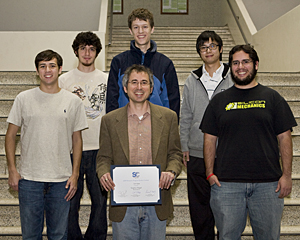
1:47 p.m., Dec. 4, 2009----The University of Delaware's Delaware Team A* came away with a share of the top prize at Supercomputing 2009 (SC09), the international conference for high performance computing, networking, storage and analysis, held last month in Portland, Ore.
The SC09 Student Competition is a daylong, competitive programming event with teams of up to five members competing to solve from six to 12 problems from various scientific domain areas.
Coached by Stephen Siegel, assistant professor of computer and information sciences, Delaware Team A* included Guilherme Fernandes, Lifan Xu, Robert Deaton and Abel Licon, all graduate students in the College of Arts and Sciences, and Alex Stachnik, a home-schooled high school student taking courses in the Division of Professional and Continuing Studies.
The team name is based on the A* search algorithm, something very familiar in the world of computer science.
The second UD team, Delaware Hen and PC, coached by David Saunders, chairperson of the Department of Computer and Information Sciences, took second place honors. Team members included Timothy Zirkel, Trilce Estrada, Quan Deng, Adnan Ozsoy and Ahmed El-Hassany, all graduate students in the College of Arts and Sciences.
The competition
About a week before the event, problem teasers, or short general descriptions, are given out, during which time students can research the topics, Siegel said.
“They are allowed to talk with anybody and use any resources they want. The full problems are released the morning of the event,” Siegel said. “At that point the team members cannot communicate with anyone until the contest ends in the evening.”
Team members started meeting about two months ago to go over previous problems, Siegel said.
“Coaching the team was fun, because the students mainly coached themselves,” Siegel said. “Dave Saunders also helped, and we would throw out suggestions and point the students in certain directions, but for the most part the students took the initiative and figured out what they needed to learn.”
At the competition, team members included on-site participants and teammates participating from campus at UD, Fernandes said. “The problem set was a nice match for our team because we could divide the workload cleanly. We had fun doing it. It was definitely a good first experience for us.”
Working with coaches Siegel and Saunders, as well as participating in the competition was a great experience, El-Hassany said.
“The team was just perfect, with diverse backgrounds in both culture and science, and each one of us represented a unique building block for a great team,” El-Hassany said. “The collaboration between us during the contest, with two of us at Portland and three at UD, via Skype, was great. We had fun during the nine hours, even though half of us were on different sides of the country.”
Estrada, who said it was an amazing experience that addressed her love of thinking hard and solving problems, would also like to see more women participate in future competitions.
“I was the only woman in the contest,” Estrada said. “I am happy we got a good place in the competition, because now other women can see that this also is a field where we can excel.”
Estrada also noted that the practice sessions and coaching helped along with her educational experience at UD that helped provide the strong computational background necessary for problem solving at the competition.
“The required knowledge included algorithms, discrete math, statistics, machine learning, parallel computing and some programming,” Estrada said. “We are lucky because most professors at the computer science department are extremely bright and passionate, and that was reflected in the performance of both UD teams.”
The National Science Foundation's Delaware Experimental Program to Stimulate Competitive Research, or EPSCoR, housed in the Delaware Biotechnology Institute, assisted with travel costs for 11 UD students who served as volunteers at the conference.
Daniel Orozco, an engineering major and student volunteer, said that the EPSCoR sponsorship was an excellent way to help students participate in “the most representative conference in high performance computing available today.”
“The approximately 20 hours work assigned to each student volunteer is handsomely compensated by the networking and learning opportunities available at the conference,” Orozco said. “I highly recommend the student volunteer program to students pursing degrees related to high performance computing and I encourage them to apply well in advance for the next year.”
As for the coaches, they hope to plan to do it all again next year, Siegel said. “It's a good way to keep abreast on the latest development in high performance computing, and to have fun doing it.”
Article by Jerry Rhodes
Photo by Ambre Alexander